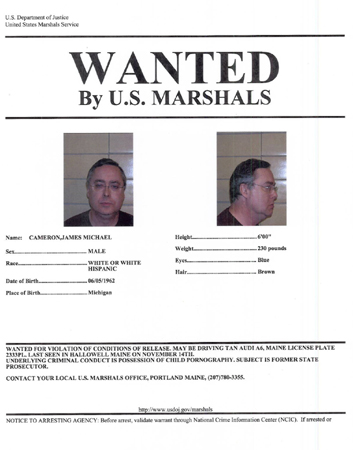Federal prosecutors argued James Cameron, who is now the subject of a nationwide manhunt, was a flight risk when they indicted him on child pornography charges in 2009, but a U.S. District Court judge the following year found no evidence the former prosecutor would flee while he appealed his conviction.
Cameron, 50, who has been out of prison since August 2011, fled his Rome residence Nov. 14 or 15 and is now the subject of a national manhunt led by the U.S. Marshals Service. He cut off his electronic monitoring bracelet hours after he learned most of the appeals of his convictions had failed in a federal court and he was likely heading back to prison.
A marshals service spokesman said Tuesday that the hunt for Cameron was continuing and there were no updates on the search.
The possibility of Cameron would flee has been addressed in court documents since July 2009, when Assistant U.S. Attorney Gail Malone, who was prosecuting Cameron, said in an affidavit that she broke a promise she made with Cameron’s then-attorney Peter Rodway because she found Cameron had been traveling overseas in weeks before the indictment.
Rodway said Tuesday that the promise was that “when (Malone) got ready to indict him, she would tell me and I would produce Jim at the time and place they told me.” That would ensure that no warrant would be issued for Cameron’s arrest, he said.
In the affidavit, Malone wrote that after the promise was made, her office learned Cameron had traveled abroad on “a number of occasions, including more than once in the final weeks preceding the indictment.”
Rodway said he didn’t know where Cameron traveled, and Donald Clark, another assistant U.S. attorney, said he couldn’t discuss that. Pre-trial bail conditions later forced Cameron to surrender his passport and not seek another.
“We therefore became concerned that (Cameron) might flee if he was aware that charges were imminent,” Malone wrote. “Because of these concerns, we were not willing to honor that promise and instead sought a warrant for his arrest following the return of the indictment.”
A 2010 order from U.S. District Court Judge John Woodcock following Cameron’s conviction said there was “no evidence that Mr. Cameron is likely to flee,” but since he had been convicted of the crimes, “his flight potential is elevated.” With that order, he denied Cameron’s request then to be released after the verdict.
Cameron went to prison immediately for six months until his sentencing hearing in March 2011. Then, he was held for another six months until the U.S. Court of Appeals for the 1st Circuit ordered him released on bail in August 2011 pending his appeal. Woodcock set the bail conditions, which included the electronic monitoring and a curfew.
A court document filed by Cameron’s federal probation officer earlier said Cameron had complied with all of his conditions of release.
In a Tuesday email, Peter Horstmann, Cameron’s current attorney, said Cameron was never a flight risk and the “old government report” — the Malone affidavit from 2009 — “does not shed any new light on the matter.”
Rodway said he never saw anything that suggested Cameron would flee. He said he was surprised to learn that Cameron fled. He seemed concerned that no one appeared to know where he was.
Clark said Tuesday there weren’t any warning signs of Cameron’s escape other than what U.S attorneys argued early on.
“The government doesn’t have any basis to say otherwise,” he said.
When Cameron learned there was a warrant for his arrest in 2009, he got in his car and drove back to Bangor from Michigan, where he’d been staying with his brother, according to Rodway.
“I don’t think they had any basis (to believe he’d flee) back then,” Rodway said. “In retrospect, it’s kind of hard to argue otherwise.”
Clark said that the concern raised in 2009 was based on several circumstances. He said a history of traveling abroad heightens the risk of criminal flight, but Cameron’s case was unique because of the seriousness of the charges, the travel and the fact he wasn’t living in Maine leading up to the indictment.
Published reports of Cameron’s first court appearance in February 2009 say the government argued that Cameron should have been held without bail until his case was resolved, but U.S. Magistrate Judge Margaret Kravchuk set his bail at $75,000 unsecured and released him to the custody of his brother, among other conditions.
Clark said the government was arguing that Cameron “posed a risk of flight which could not be satisfied by anything other than detention.”
Clark said after the conditions were imposed Cameron “appeared as required right up until the day he was convicted at trial,” Clark said.
In an emergency motion for release filed in June 2011, which was granted that August, Cameron said he was not a flight risk.
He demonstrated that by saying he was free for 34 months — from a search of his home on Dec. 21, 2007, until his conviction on Aug. 23, 2010.
Rodway called Cameron “one of the toughest people I know,” emotionally and mentally. He said he has talked with Cameron a few times since his release from prison in August 2011.
“When I was dealing with Jim Cameron he was a very emotionally strong guy,” Rodway said. “He had a lot on his plate and was facing a lot of pressure and he handled it pretty well — much better than I could have, probably.”
Michael Shepherd — 621-5632
mshepherd@mainetoday.com
Send questions/comments to the editors.





Comments are no longer available on this story